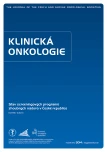Epidemiology of Cancers with Implemented Screening Programmes in an International Comparison
Authors:
L. Dušek 1,2; J. Mužík 1,2; D. Malúšková 1; J. Gregor 1
Authors‘ workplace:
Institut bio statistiky a analýz, LF a PřF MU, Brno
1; Ústav zdravotnických informací a statistiky ČR, Praha
2
Published in:
Klin Onkol 2014; 27(Supplementum 2): 40-48
doi:
https://doi.org/10.14735/amko20142S40
Overview
International data document that the Czech Republic ranks among the countries with the highest cancer burden in Europe and worldwide. Preventable cancer diseases, i.e. colorectal, breast, and cervical cancer, are among the most frequent types. These international studies also bring some positive information, e.g., stabilised or slightly decreasing mortality, better treatment outcomes and patient survival rates. However, it should be noted that, with regard to the high population burden, these results are achieved at the very high price of costly modern cancer treatment.
Key words:
GLOBOCAN – international data – colorectal cancer – breast cancer – cervical cancer
This study was supported by the project 36/14//NAP “Development and implementation of methodology for the evaluation of effectiveness of personalised invitations of citizens to cancer screening programmes” as part of the programme of the Czech Ministry of Health “National action plans and conceptions”.
The authors declare they have no potential conflicts of interest concerning drugs, products, or services used in the study.
The Editorial Board declares that the manuscript met the ICMJE “uniform requirements” for biomedical papers.
Submitted:
4. 9. 2014
Accepted:
17. 10. 2014
Sources
1. Ferlay J, Steliarova ‑ Foucher E, Lortet ‑ Tieulent J et al. Cancer incidence and mortality patterns in Europe: estimates for 40 countries in 2012. Eur J Cancer 2013; 49(6): 1374 – 1403. doi: 10.1016/ j.ejca.2012.12.027.
2. Ferlay J, Soerjomataram I, Ervik M et al (eds). GLOBOCAN 2012 v1.0, Cancer incidence and mortality worldwide: IARC CancerBase No. 11 [monograph on the Internet]. Lyon: International Agency for Research on Cancer; 2013. Available from: http:/ / globocan.iarc.fr.
3. Brenner H, Hoffmeister M, Brenner G et al. Expected reduction of colorectal cancer incidence within 8 years after introduction of the German screening colonoscopy programme: estimates based on 1,875,708 screening colonoscopies. Eur J Cancer 2009; 45(11): 2027 – 2033. doi: 10.1016/ j.ejca.2009.02.017.
4. Otto SJ, Fracheboud J, Looman CW et al. Initiation of population‑based mammography screening in Dutch municipalities and effect on breast ‑ cancer mortality: a systematic review. Lancet 2003; 361(9367): 1411 – 1417.
5. Ascunce EN, Moreno‑Iribas C, Barcos Urtiaga A et al. Changes in breast cancer mortality in Navarre (Spain) after introduction of a screening programme. J Med Screen 2007; 14(1): 14 – 20.
6. Lăără E, Day NE, Hakama M. Trends in mortality from cervical cancer in the Nordic countries: association with organised screening programmes. Lancet 1987; 1(8544): 1247 – 1249.
7. De Angelis R, Sant M, Coleman MP et al. Cancer survival in Europe 1999 – 2007 by country and age: results of EUROCARE ‑ 5 – a population‑based study. Lancet Oncol 2014; 15(1): 23 – 34. doi: 10.1016/ S1470 ‑ 2045(13)70546 ‑ 1.
Labels
Paediatric clinical oncology Surgery Clinical oncologyArticle was published in
Clinical Oncology

2014 Issue Supplementum 2
- Possibilities of Using Metamizole in the Treatment of Acute Primary Headaches
- Metamizole at a Glance and in Practice – Effective Non-Opioid Analgesic for All Ages
- Metamizole vs. Tramadol in Postoperative Analgesia
- Spasmolytic Effect of Metamizole
- Metamizole in perioperative treatment in children under 14 years – results of a questionnaire survey from practice
-
All articles in this issue
- Results of the Czech National Colorectal Cancer Screening Programme – Faecal Occult Blood Tests
- Results of the Czech National Colorectal Cancer Screening Programme – Colonoscopy Examinations
- Performance Indicators in Screening Programmes
- Implementation of Performance Indicators in the Czech Breast Cancer Screening Programme – Results of the Regular Monitoring
- National Web Portals as an Official Communication Platform of Cancer Screening Programmes
- Role and Importance of Civil Society Organisations in the Support of Cancer Screening
- New European Information and Communication Platform Striving for Improved Care for Colorectal Cancer Patients – www.crcprevention.eu
- Objective Need for Cancer Prevention in the Czech Republic and Europe, and the State Thereof
- Epidemiology of Screening‑ targeted Cancers According to New Data of the Czech National Cancer Registry
- Epidemiology of Cancers with Implemented Screening Programmes in an International Comparison
- State and Development of Background Information for the Evaluation of Czech Cancer Screening Programmes
- Approach to Population‑based Screening in the Czech Republic, Methodology and First Results of the Personalised Invitation of Citizens to Cancer Screening Programmes
- Results of the Czech National Breast Cancer Screening Programme
- Results of the Czech National Cervical Cancer Screening Programme
- Clinical Oncology
- Journal archive
- Current issue
- About the journal
Most read in this issue
- Performance Indicators in Screening Programmes
- Results of the Czech National Cervical Cancer Screening Programme
- Results of the Czech National Breast Cancer Screening Programme
- Results of the Czech National Colorectal Cancer Screening Programme – Colonoscopy Examinations
